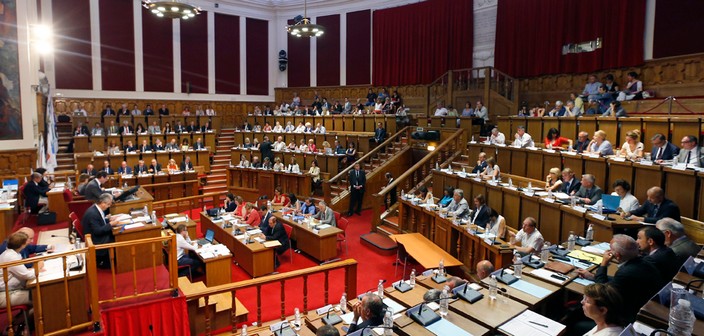A dull assembly (stifling heat, fatigue after a year of conflict, and approaching holidays) tackled an agenda that was rather limited compared to the voluminous ones we were used to.
The deliberations were quite swift, and without the eternally impetuous approach of the President of the Metropole and his “abrasive” handling of the opposition, the proceedings might have even taken place in a soporific atmosphere.
It is true that the arguments didn’t lend themselves to heated debates: how can one be passionate about a subtle word battle to decide on supporting the Promenade des Anglais’ candidacy for UNESCO World Heritage listing, to which an (anonymous?) hand has added “and the winter city”?
Doesn’t the mysterious reason simply lie in the need to enhance the intrinsic value of the dossier with an additional “intangible” concept linked to the origin of Nice’s international fame?
Too difficult to explain without making it a case of lese-majesty?
The main (and positive) point of the session was the creation of the Pass Bleu Azur, which will combine on a single ticketing support (and a single registration fee) the annual subscribers of Lignes d’Azur and the users of Auto Bleu and Vélobleu: an intelligent initiative that considers the integration of non-polluting transport modes and aims to alleviate a problematic and burdensome urban and intra-urban traffic.
In the same vein is the combined pricing between the Réseau Lignes Azur (RLA) and the Trains Express Régionaux (TER), aimed at facilitating intermodality and allowing for the combination of both subscriptions into a single pass. This agreement will be operational from 2018.
Finally, a new pricing grid has been approved for the Auto Bleues service, which includes an average increase of 5% and the introduction of payment for the electric recharging of private vehicles at stations.
Patrick Allemand (PS) revisited this deliberation, after denouncing “the significant reduction of service since the fleet is reduced from 210 vehicles to 140″, “the new provisions on the distribution of losses which represent an additional burden estimated at 138,000 euros”, he pointed out “a first sign of failure and a reduction in ambitions”.
His analysis ends with a reminder of an obvious fact: “I believe that the management of transport accounting, leading to the reduction of hillside lines* and blue cars, is management on a small-time basis, without a strategic overall vision for an attractive transport policy”.
Finally, a motion was passed for the modification of the 2006 so-called “coastal” law that regulates natural and artificial beaches. In two words, it is about finding a loophole to not apply it or, at the very least, opting for “a specific regulation adapted to the Mediterranean basin and more specifically to the Côte d’Azur.”
In fact, a call for a “à la carte” law, based on the desires of the profession whose national president is from Nice. The motivations can be found in the 17 “considering” clauses of the text. What a literary feat!
As an example of reformism we have seen better, but we know that change… is meant for others.


